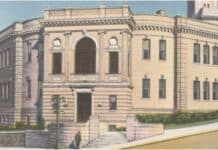
The National Sugar Refining Company on the Yonkers Waterfront in the early 1920’s. The plant is still open in Yonkers run by Domino’s Sugar
By Mary Hoar, City of Yonkers Historian, President Emerita Yonkers Historical Society, recipient of the 2004 Key to History, Member of the Yonkers Landmarks Preservation Board, and President Untermyer Performing Arts Council
Monday, April 1st:
April 1, 1917: Members of more than ten organizations and societies gathered at the Warburton Theater and passed resolutions asking Congress to declare war on Germany.
April 1, 1943: Twenty-two-year-old Staff Sergeant Albert DePew, US Army Air Forces, was a power-operated gun turret specialist, aircraft armorer and crew chief of a bombardment ground detachment. While at Greenville Army Air Base, he found proof of Yonkers’ active part in our country’s war effort, a plaque on a new North American B-25 medium bomber. The plaque was inscribed with dozens of names whose War Bond purchases paid for the plane, including five Yonkers residents: Harry Lacey, Mr. and Mrs. M. Walsh, Sidonie Howard and Mary LaBelle. He thanked them for their contributions, adding he hoped to find more Yonkers names, “carried with the ships into combat.”
Tuesday, April 2nd
April 2, 1941: Colonel Campanole, Officer in Charge of the Otis Elevator Company Guard Detail, announced all employees must show formal identification before they would be admitted to the plant.
April 2, 1945: Otis President LeRoy Petersen released the company’s annual report; it revealed Otis helped design “new, revolutionary airplanes” for a large “aircraft manufacturing company,” and hired hundreds of engineers to do so. Otis produced “aircraft engine crankcases, landing gear and tail wheel assemblies” for both “transport and cargo planes,” “gun turrets for navy planes,” “recoil gun mechanisms,” and numerous other items. Petersen noted 1944 was the company’s most financially successful year, with an average 41% weekly pay increase for the ten thousand employees in its US operations.
Wednesday, April 3rd
April 3, 1945: The Yonkers Historical Society placed a bronze plaque by the historic Odell Tree on Odell Avenue. Believed to be between 800 and 1000 years old, the Odell Oak was believed to be the “oldest living thing in Yonkers.”
April 3, 1952: The US Department of the Interior’s Bonneville Power Administration awarded a contract to Habirshaw Cable & Wire Corporation to manufacture a pipe-type 230,000-volt power cable to be installed beneath the Puget Sound near Seattle!
Thursday, April 4th
April 4, 1941: Two Yonkers companies received large contracts from Navy Supplies in Washington. Habirshaw Cable and Wire Corporation received a large order for electric cable and National Sugar Refining Corporation received a contract for more than $150,000 of granulated sugar.
April 4, 1945: Former Corporation Counsel Arthur Hume filed a $50,000 slander lawsuit again Ninth Ward Alderman William Slater in the NY Supreme Court. Hume’s complaint stated Slater maligned him speaking at the transit public hearing in the Council chambers ten days earlier. Slater’s comment? “I consider this nothing more than another political move.” At the hearing, Slater said the Suburban Bus company paid Hume $18,000. He also said Hume was named receiver of Suburban.
Friday, April 5th
April 5, 1905: Mary Marshall Butler, founder of the Woman’s Institute, spoke on “Needs and Conditions of the Colored People in Yonkers” at the Institute’s Philanthropic Department meeting. Reverend John Smyer, pastor of the African M. E. Zion Church, spoke on the expectations of African Americans. Reverend Booker, Pastor of the Messiah Baptist Church, addressed the need for good homes and difficulties finding employment, pointing out people who could have benefited the Yonkers community left because of lack of work. Dr. John Morgan spoke about tenement conditions in the city, stating Yonkers had the worst he ever had seen; he believed the unsanitary conditions were responsible for the spread of TB.
April 5, 1934: One hundred sixty-nine cheering and singing men, eighteen to twenty-five years old, left Yonkers for the Civilian Conservation Corps Camp at Iona Island near West Point. The men agreed to work in forestry or as ranger for six months, earning $30 monthly, with most of their salaries assigned to their families; they kept $5 monthly to cover any expenses they had. Hordes of relatives saw them off; some some men were away from home for the first time!
This was the first time Yonkers CCC members were assigned in New York State; because of the camp’s closeness to Yonkers, families were allowed to make Sunday visits.
Saturday, April 6th
April 6, 1917: After numerous attacks on American ships, Congress declared war against Germany. Our reserve forces immediately were activated; the Yonkers Divisions of the NYS Naval Militia mobilized before nightfall. They met in the Elks’ Club and marched to the train station. The men received weeks of intensive training on the USS Granite State, then transferred to US war vessels for service.
April 6, 1927: Wearing white sailor hats, members of the Yonkers Naval Militia Veterans’ Association gathered in the Elks’ Club, the very site where they mobilized ten years earlier to serve in the World War. A banquet was held to honor their service, service that “reflected great credit on the manhood of Yonkers,” according to the Yonkers Herald. More than 300 attended the dinner; besides the association members, local officials and members of Yonkers fraternal organizations and veterans’ posts attended.
Sunday, April 7th
April 7, 1936: Thirteen Roosevelt High School students, eleven boys and two girls, organized the Tuckahoe Post, Veterans of Future Wars, and its auxiliary, under post commander Robert Wronker. The group received its charter from Veterans of Future Wars National Headquarters at Princeton. Wronker was editor of The Crimson Echo, the school publication.
April 7, 1942: Recruiting for Yonkers Army enlistment was put in the hands of the Women’s Army Auxiliary Corps (WAAC)! Lillian Reed assumed charge of recruiting for Westchester and Putnam Counties at the Yonkers Post Office Building, and accepted enlistment applications for both WAAC and the Army daily; Reed transferred from the Grand Central Palace recruiting office.
Questions or comments on this column? Email YonkersHistory1646@gmail.com. For information on the Yonkers Historical Society, Sherwood House and upcoming events, please visit our website www.yonkershistoricalsociety.org, call 914-961-8940 or email info@yonkershistoricalsociety.org.





